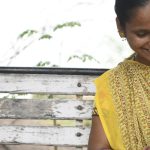HEALTH
Domestic violence victims face challenges such as having their source of income or livelihood being tied to their abuser, which in most cases happens to be their spouse. It is, therefore, imperative to appreciate the importance of women’s education and empowerment in India, as it contributes to their financial security. Economically independent, working women tend to have brighter prospects and can better protect themselves against most forms of domestic abuse. This is true specially in the cases involving women from rural and vulnerable populations in India.
Domestic abuse can trigger anxiety, take a massive toll on the victim’s mental health, and lead to long-term conditions such as Post Traumatic Stress Disorder (PTSD). It is extremely difficult for victims of abuse to overcome suicidal thoughts, low self-esteem, and anxiety, and regain faith in people. By showcasing examples of women who successfully battled adversities such as poverty and domestic abuse, others can be inspired to regain their independence and support themselves. Survivors of abuse are called “Phoenix Women” or the women that rise from the ashes of societal and gender discrimination.
Shivakantha, is a 40-year-old mother of three from a humble village called Eraiyur. She is a survivor of physical abuse, as she was subjected to poor treatment by her spouse. Hoping to put an end to her misery, Shivakantha attempted suicide six years ago. Fortunately, her neighbours came to her rescue and acquired support from a local charity organisation that took care of her medical expenses and children’s education. Through the charity, Shivakantha learnt to sew and soon started working for a textile exporting firm.
After a brief period, the pandemic struck, leaving her unemployed as her employer was forced to shut down. To add to her woes, her husband suffered a one-sided stroke and paralysis, meaning he could not walk or speak. Unshaken by the obstacles she faced, Shivakantha tapped into the new skill she had acquired – tailoring. She requested a sewing machine and began to generate income to support her family.
Shivakantha also underwent special training to make jute bags and poly-woven sewing. She started her successful journey as an entrepreneur by joining a tailoring group, hoping to attain financial independence. Today, Shivakantha aspires to become a fierce entrepreneur and turn her wounds into a story of triumph over adversity. She expresses her sincere gratitude to Royal Enfield and CARE India for rebuilding the lives of women like her by way of economic empowerment in India through entrepreneurship development programmes.
CARE India is a women’s empowerment NGO that works towards improving the lives of women from rural and marginalised populations across India. The NGO for women has several women entrepreneurship initiatives that equip women with invaluable skill sets to help them gain financial independence through entrepreneurship. Apart from women empowerment in India, the organisation’s efforts also aim to attain nutrition security for women. You can provide online donations to women’s organisations in India to help promote rural livelihoods and women’s entrepreneurship.
About the Programme: The “Promotion of Women’s Economic Empowerment Through Entrepreneurship” project, implemented by CARE India with the support of the Eicher Group Foundation, is a transformative initiative aimed at empowering women in the Sriperumbudur block of Kanchipuram district, Tamil Nadu. Over a span of 36 months, the project aims to mobilize 500 women from five villages, fostering entrepreneurship and self-sufficiency. Its core strategy involves the establishment of Self Employment and Entrepreneurship Development (SEED) Centres, which provide comprehensive training on entrepreneurship skills, business planning, and market assessment. The project also facilitates the formation of women’s collectives and aids in the establishment of individual and collective enterprises. By linking women to government schemes and banks, it ensures access to necessary credit. The ultimate goal is to create sustainable, women-owned enterprises, managed independently by the entrepreneurs themselves, thereby promoting economic empowerment and self-reliance.






